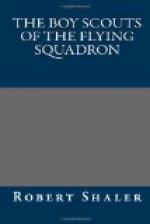“See that tree lying there chopped down?” he asked Hugh, as they came upon a pretty fairsized specimen of the forest monarch, which, after being put to the ax, had broken many limbs off when it crashed down. “Well, I did that little job all by myself. Want to know why?”
“I might give a guess, as I see traces of old honeycomb around here. I’ll warrant you discovered a hive of bees in this tree and meant to get gallons and gallons of their fine stores. How about that, Ralph?”
“You struck the right nail on the head,” laughed the other, “just as I felt certain you would when I saw you look around that way. Yes, I felt amply repaid for all my work after cutting through the tree, because two years ago times were a bit hard with the Kenyons, and all that nice honey proved a treat in our family circle, you’d better believe.”
“How did you find the honey tree,—–by tracking the bees up the usual way?” Hugh asked.
“That was how I did it,” Ralph replied. “I once saw a regular bee hunter do the stunt, and so I knew how; and it worked right well, too. I started out with a little honey and coaxed a wandering bee to fill himself up. Then with a pair of old opera glasses, I watched his flight just as far as I could see him. Going over to that point, I repeated the experiment. After doing it for about six times I saw my loaded bee rise, and make for this tree. Then, as it was a warm noon, I discovered a swarm of young bees trying their wings away up in the air, and I knew I had located the tree hive. It is an easy job, once you get on to it, Hugh.”
“Some time I’d like to come out with you and try for another hive,” observed the other scout. “But it’s too late this year, because, unless a very warm day happens to come along, the bees will stick close to their hives.”
In this sort of fashion the afternoon did not hang heavy on the hands of the two boys. It never does with scouts who are alive to their opportunities along the line of investigation. Time passed so quickly and pleasantly that, almost before either of them suspected it, the sun started to go down. And about the same moment they heard Bud giving the Wolf signal, not in a fashion to indicate any pressing necessity for their presence at the shack, but just to tell them he was getting lonely and that they had better come home.
They found that Bud had started supper, being in a joyous frame of mind because of the glittering prospects for success in connection with his new invention. Bud was a novice in the business. He would doubtless learn in due time how many bitter disappointments attend the fortunes of all those who spend their waking hours in trying to conjure up startling innovations.
After the evening meal had been enjoyed to its limit and everything cooked by Bud had vanished, the three chums again sat around and talked on all sorts of interesting subjects.
Bud, however, seemed to be uneasy. Perhaps it was on account of his anxiety to have the morrow come, when he could improve on the trial of his model aeroplane. Then again it might have been that the attempted larceny of his precious plan wore upon his mind.




